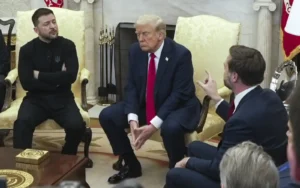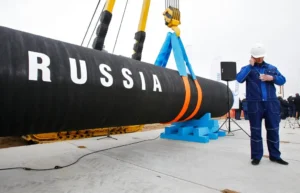Area of Kharkiv after missile impact, 2022 (source: Flickr)
It will no doubt have been an uncomfortable week in the Kremlin. While the local and regional elections were easily won by the United Russia Party and other pro-Kremlin candidates (as anticipated) with a landslide victory, it was mainly the rapid Russian territorial loss in northeastern Ukraine that dominated the news, both internationally and domestically. It seemed to open a window of opportunity in Russia to express criticism of the Kremlin.
First elections since invasion of Ukraine
Across Russia, local elections in 82 regions, including 14 governorships and 1,417 municipal seats in Moscow were held during a three-day period. They were the first elections to take place since Russia’s invasion of Ukraine. Election campaigns were at a low ebb due to wartime censorship laws and the arrest of political opponents, such as prominent Kremlin critic Ilya Yashin who was sent to pretrial detention for discrediting the Russian Military. Many anti-Kremlin politicians have already fled the country or are imprisoned for expressing criticism of the Russian invasion of Ukraine. Hence, no major political shifts were expected in these elections beforehand, and the results confirmed exactly that.
Candidates for the United Russia Party or other Kremlin-loyalists won the elections with a landslide in all 14 regions where governors were elected. In Moscow, more than 77% of seats were won by pro-Kremlin candidates. On occasion, in the lower levels of municipal councils, Kremlin critics were able to be elected. Despite almost tripling the number of voters in Moscow’s municipal elections, turnout remains low, with only 34% of Muscovites casting a ballot (in 2017, it was around 14%). Golos, the independent elections watchdog who also played an important role in recording voter fraud in the 2020 elections in Belarus, recorded various cases of manipulation used by the Kremlin to influence the nationwide election results. In total, Golos recorded more than 1,700 reports of violations during the three-day election; Russia’s Central Election Commission stated that it only received 93 reports.
Russians retreat from Northeast Ukraine
Meanwhile, the Kremlin cannot enjoy the large victory in the elections due to the huge losses suffered on the battlefield in Ukraine. In September only, Ukraine claimed it has retaken more than 6,000 km2 from Russian control, mostly in the Kharkiv Oblast in the Northeast of Ukraine. As a response to the rapid advance of the Ukrainians in the northeast, the Kremlin’s explanation was that Russian forces were regrouping in the Donbass. For some time considerable criticism has been circulating on pro-Russian Social Media, in which the military is accused of making mistakes and anger about the Russian defeats are expressed by nationalist Russian bloggers. Even Ramzan Kadyrov, Putin ally and Kremlin-appointed leader of the Chechnya region, has openly criticised the Russian army by saying that: “If today or tomorrow changes are not made in the conduct of the special military operation, I will be forced to go to the country’s leadership to explain to them the situation on the ground.”
The setback in Ukraine also led to public criticism of Putin’s leadership on national television for the first time in a long time. On September 11, Gazprom-owned channel NTV aired a debate between panelists in which former Russian lawmaker Boris Nadezhdin expressed his discontent by saying: “We’re now at the point when we have to understand this: It’s absolutely impossible to defeat Ukraine using the resources and colonial war methods with which Russia is trying to wage war.” Rather than contradicting the justification of a war in Ukraine, it is the Kremlin’s failing military strategy that has been the main point of criticism. In addition, criticism is mostly directed at Putin’s advisers and military leadership, but the president himself is kept out of the picture.
Russian lawmakers petition for Putin’s resignation
On the 7th of September, two days before the 3-day voting period began, Russian lawmakers from the Smolninksoye district in St. Petersburg and Lomonosovksy district in Moscow called for Putin’s removal from power over the war in Ukraine by petitioning to the State Duma. After filing the petition for treason, lawmakers were informed by police that they would face legal charges for discrediting the Russian government. The Russian lawmakers from the Smolninksoye district, Nikita Yuferyev and Dmitry Palyuga explain that they acted in compliance with Russian law, which excludes the possibility of conviction following a petition to a state body. The idea to send a petition arose after observing criticism of the invasion of Ukraine on social media, including pro-Kremlin channels. On Monday 12 september, already-serving municipal deputies from 18 councils in Moscow and St. Petersburg signed the petition calling for Putin’s resignation due to treason.
While the local elections were a victory, the calls from Russian lawmakers to remove Putin from power and the criticism on the military Russian command show cracks in Putin’s administration. In all likelihood, he will want to seal these as soon as possible, before they become irreconcilable.
Author: Mathieu Neelen
Sources: AlJazeera, BBC, DW, France24, Radio Free Europe1, Radio Free Europe2, MoscowTimes1, MoscowTimes2, NewYorkTimes
Photo: Flickr



